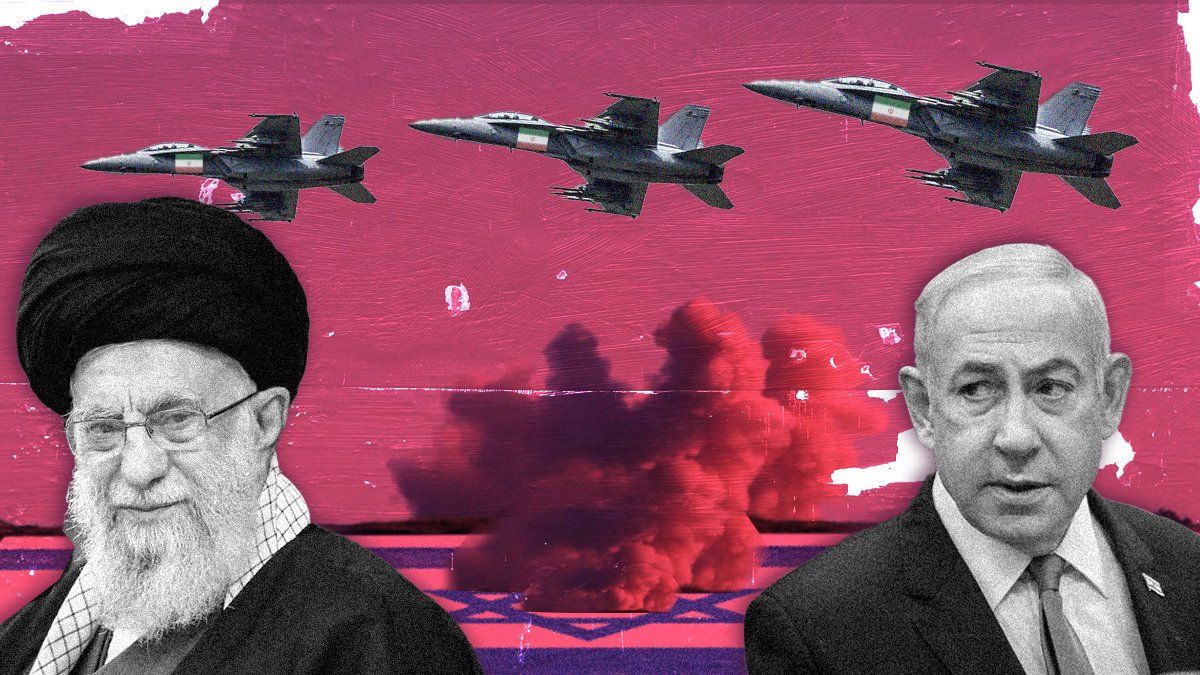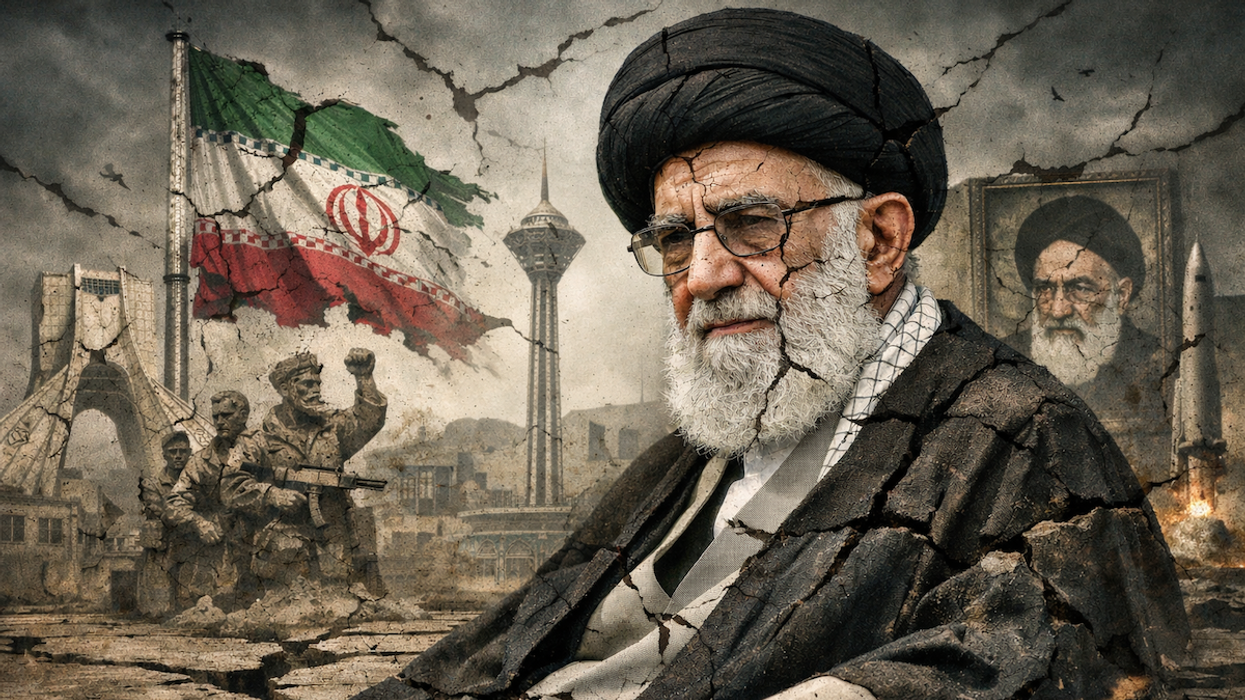On April 13, Iran launched hundreds of drones and missiles from its own territory in its first-ever direct, attributable attack against Israel, thrusting the long-simmering shadow war between the two regional foes into the light.
This show of force reflects a dramatic shift in strategy from Tehran, which had previously relied exclusively on its proxies to target Israel. The inflection point was Israel’s bombing of the Iranian consulate in Damascus on April 1, which killed the senior-most Iranian military leader in Syria and was compared to an attack “on Iranian soil” – a bright red line for the Islamic Republic. So from Iran’s perspective, it was Israel that crossed the rubicon first. Last weekend’s attack was a proportional response in that view – and a measured one at that.
Does that hold up? What comes next? And what does it all mean?
Iran’s not-so-escalatory escalation
On one hand, last weekend’s attack was dangerous and provocative, posing the first serious external threat to Israel’s security since Saddam Hussein fired Scud missiles at the Jewish state in 1991 and heightening the deep sense of existential insecurity Israelis have felt since Oct. 7. Had any sensitive military targets been hit or Israelis killed, we would now be looking at direct war between Iran and Israel, likely also involving the United States. Not World War III, but a major regional war.
On the other hand, the fact that we aren’t currently in that scenario means that the attack could have been a heck of a lot worse. That it wasn’t was mostly by design (the other bit was luck): Iran telegraphed its attack well in advance both publicly and through backchannels with several regional powers to minimize the damage and prevent an escalatory response. The heads-up given to the United States via Iraq and Turkey – and the use of low-altitude, slow-moving drones that could be seen coming from literally 1,000 miles away – allowed Israel and its partners ample time to pre-position their military assets and intercept nearly all Iranian projectiles (as well as get Israeli citizens into bomb shelters, out of harm’s way). As a result, of the roughly 170 drones, 120 ballistic missiles, and 30 cruise missiles that Iran launched, 99% were shot down, most before they could reach Israeli airspace. All of them were aimed at military rather than civilian targets.
The advance notice, as well as the choice of targets and weaponry, suggest that Iran deliberately calibrated the strike to limit casualties and keep a lid on potential retaliation. That’s why Iran refrained from using Hezbollah and attacking US forces throughout the region. It’s also why it announced that no further (direct) attacks would be forthcoming and it considered the matter closed as long as the Israelis took it on the chin.
Incidentally, this is exactly the same playbook the US used to respond to the Iranian proxy attacks that killed three American servicemembers in Jordan at the end of January. The Biden administration didn’t want to start a shooting war with Iran (for obvious reasons), so they waited four days to hit back and gave a heads-up to Tehran via Iraq so the Iranians could get their forces out of the area, while cautioning them that next time there would be direct consequences and no such forewarning.
In both cases, if the US and Iran had wanted to seriously escalate, they could have. But the goal wasn’t to escalate – it was to reset the bar on deterrence and relieve domestic pressure in response to a provocation while preventing damage that would bring the conflict into a wide-scale regional war.
None of this means that this was an easy balance for Tehran to strike (no pun intended) in practice. Despite all the calibration and telegraphing that went into the attack, it was still a risky gamble, with lots of room for accidents and miscalculation. Some drones or missiles could have evaded defenses and found their targets. Israeli soldiers or civilians could have died. The US would have treated a successful Iranian strike on Israeli soil as an attack on itself and responded accordingly. The risk of a shooting war with America was not zero, and the Iranians were willing to live with that.
What will Israel do next?
The ball is now in Israel’s court. Israel needs to respond somehow to signal that this type of attack won’t be tolerated in the future, but it is up to war cabinet members Prime Minister Benjamin Netanyahu, Defense Minister Yoav Gallant, and opposition leader Benny Gantz to decide exactly when, where, and how to strike back, weighing the benefits of retaliation against the risk of provoking further escalation and alienating Israel’s allies.
Domestic views are currently split between revenge and restraint. The far right is pushing for a strong, immediate, and direct strike on Iranian soil that would likely require US cooperation but that Washington wants nothing to do with, as it would compel Tehran to counterattack and dramatically expand the conflict. Netanyahu wouldn’t mind a war with Iran that draws the US in and extends his time in office, but Gantz and Gallant prefer a more calibrated and strategic response that the US can get behind – one that allows Israel to build a strong anti-Iran alliance and maintain robust US defense support without precipitating a regionwide conflict.
For its part, the Biden administration is working overtime to persuade the Israeli government to opt for a more muted response. Here, the critical role the US played in helping Israel counter the Iranian attack will probably give it enough leverage to succeed where it has previously failed in Gaza.
My bet is that the Israelis will give in to US influence, take the win, and refrain from an escalatory response at this time – meaning no major direct strikes on Iranian territory (for now at least). Of course, that doesn’t mean they’ll sit on their hands. At a minimum, they will hit Iranian proxies and Iranian assets outside Iran. They might even carry out covert and non-kinetic attacks within Iran, such as cyber or sabotage, on an opportunistic basis. These are the kinds of responses that Tehran will be willing to absorb without derailing the current de-escalatory path.
The danger: I could be wrong and the Israelis could overreact as they have consistently since Oct. 7, choosing to directly and overtly strike the Iranian homeland or take out high-value IRGC targets against America’s advice and their own best interests. Such actions would likely cross the Islamic Republic’s red lines and trigger an immediate escalatory response that could quickly spiral into a major war.
What it means
Even assuming cooler heads prevail in Jerusalem and Iran-Israel tensions stay in a de-escalatory phase, last weekend’s attack will have long-lasting implications.
First, Netanyahu’s domestic standing has improved on the back of Israel’s successful defense against an unprecedented Iranian threat in a united front with the US and other allies. This increases the embattled prime minister’s political breathing room and will prolong his time in office. Classic Bibi.
Second, the attack has pushed the war in Gaza off the front pages, as international focus has shifted toward averting regional war and away from the humanitarian crisis in the Strip. As a result, there is less pressure for Israel to compromise with Hamas on a cease-fire deal. At the same time, an Israeli ground operation in Rafah has become more likely, as the Biden administration is now principally focused on getting Israel to limit its escalation against Iran. The biggest losers, as always, will be Palestinian civilians.
Third, the attack is a political liability for US President Joe Biden, who will pay the price for any further escalation of the conflict but now lacks domestic political space to publicly criticize Israel’s actions and can only offer “ironclad” support going forward. Biden’s best hope going into the November election is to dissuade Netanyahu from expanding the conflict, lest he be blamed for presiding over yet another major war. But if he pushes too far in trying to constrain Israel, he’ll be blamed for abandoning a key US ally most voters still support (despite Gaza). Damned if he does, damned if he doesn’t.
Finally, Israeli and Iranian deterrence has eroded as both sides have crossed each other’s red lines, dropped long-standing strategic restraint policies, and raised the threshold for future responses. Iran has no plans to stop supporting its proxies in the region, and Israel has no plans to stop targeting said proxies (including Hamas in Gaza). So while Israel and Iran may have narrowly avoided major war over the weekend, the likelihood that further tit-for-tat strikes spiral into a broader regional war is increasing. The longer-term trajectory of this conflict is still expansionary. Sorry about that.



















